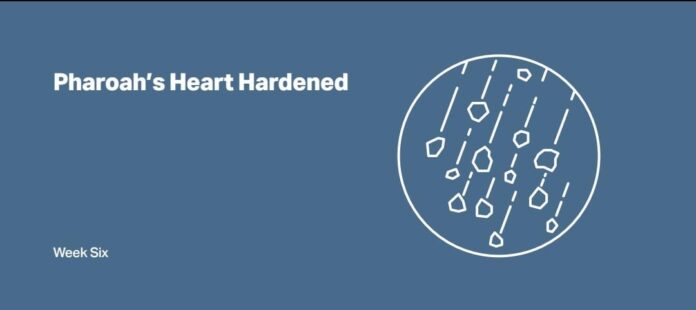The Book of Exodus | Week 06
Week’s Passage: Exodus 9
inTro
Do I Have any Say in This ?
This part looks at challenges Christians face in understanding how God exercises His power while respecting human freedom. While Christians believe that God answers prayers and is all-powerful, questions arise about whether God overrides human will to do so. Historically, the doctrine of predestination especially as taught by Augustine and later reformers like Martin Luther and John Calvin argue that God determines human destiny, choosing who is saved or damned. Calvin even taught that God predestines some to heaven and others to hell. However, Adventists reject this view, favoring a belief in human freedom and responsibility. This discussion ties into the current Bible study on how God led the Hebrews out of slavery.
inGest
Who Hardened Pharoah’s Heart
This passage explores the tension between Pharaoh’s free will and God’s power during the Exodus story. Initially, Pharaoh chose to resist God, repeatedly hardening his own heart after each of the first five plagues. Only later, starting with the sixth plague, does the Bible say that God hardened Pharaoh’s heart. This was not arbitrary; Pharaoh had already chosen a path of rebellion. God’s continued presence and appeals did not leave Pharaoh unchanged, they intensified his resistance. The story shows that when God confronts someone, their heart is either softened or hardened, neutrality is not possible.
InTerpret
Questions of Free Will
This passage explains how the New Testament, particularly Romans 9, addresses the issue of free will using the story of Pharaoh. Paul uses examples like Jacob and Esau and God’s hardening of Pharaoh’s heart to emphasize God’s sovereignty. However, Paul also clarifies that God is not unjust, He has the right to show mercy and compassion as He wills. Importantly, the statement about God “hating” Esau came centuries after Esau’s descendants had continually opposed Israel, showing it was based on long-term rebellion, not arbitrary favoritism.
In Pharaoh’s case, God only hardened his heart after Pharaoh had persistently rejected God. Paul’s point is not that God overrides human free will, but that God works within human choices to fulfill His purposes. Ultimately, Paul stresses that while God is fully in control, this does not eliminate human freedom to respond to Him.
inVite
Am I Free?
This passage explores the story of Judas Iscariot and its parallels with Pharaoh, focusing on the tension between prophecy and free will. Though Judas’ betrayal was foretold in Scripture, his actions were not forced or predestined. Jesus treated Judas with love up to the end, personally offering him food as a gesture of friendship during the Last Supper. This act symbolized a final appeal for repentance, showing that Judas still had a choice. His betrayal was a result of his own free will, not divine coercion.
Like Pharaoh, Judas repeatedly rejected God’s invitations, hardening his heart over time. The lesson is that our choices matter and each response to God either strengthens our walk with Him or makes it easier to turn away next time.
inSight
Resisting the Will of God
Ellen G. White in her books The Youth’s Instructor, The Signs of Time and Patriarchs and Prophets says that God did not make Pharaoh stubborn rather, Pharaoh’s repeated rejection of God hardened his own heart. God gave him light and chances to change, but Pharaoh chose disobedience, which led to deeper rebellion.
God never forces anyone to sin, He desires all to be saved but He allows people to follow their own will.
In Pharaoh’s case, God used his stubbornness to reveal His power and fulfill His purposes, showing that even human rebellion can serve God’s greater plan without overriding free will.
inQuire
- How do you explain God hardening Pharaoh’s heart? Base your answer in the Bible.
- What is God’s desire for all people? (1 Tim. 2:3, 4; 2 Pet. 3:9)
- What were some of the reactions of Pharoah’s servants? (E.g., Exod. 9:18–22; 10:7; 11:3)
- If you had been an Egyptian, what events would have impacted you the most in deciding whether to trust Moses or not?
- If it were true that God arbitrarily chooses certain people to be saved and others to be lost, what would the resulting picture of God look like?



